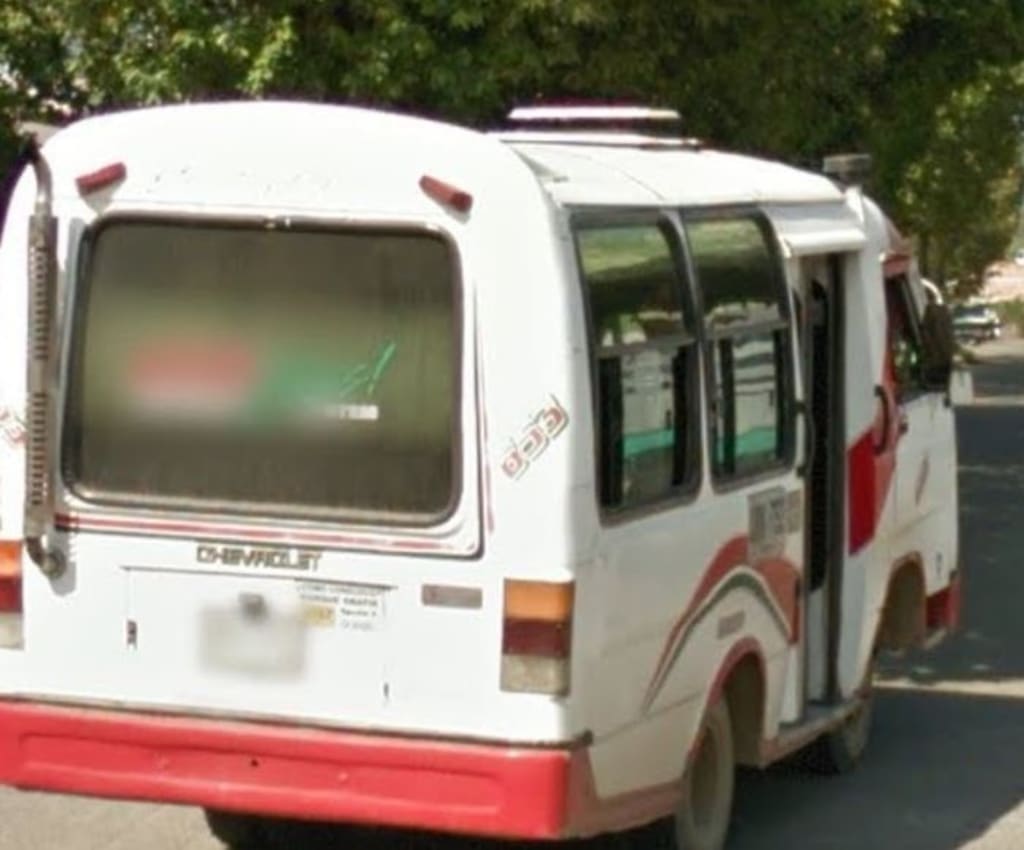
The street was hot, dusty, and littered, as it always was in the morning. Today, that included a lonely Pepsi Blue bottle rolling along outpaced by windswept candy wrappers. The litter passes unnoticed as Edwin stood with the other boys on the corner, alternating between glancing shyly at a group of girls waiting further down the street and contemplating the mercadolibre on the corner. He was wondering if he had enough pesos to buy a treat from the shopkeeper. Probably not, he concludes, after carefully counting.
Out of the corner of his eye just then, he saw her hurrying along Calle 11 ("11th Street") toward the corner of 17th Avenue where he and his friends were standing. The other boys noticed her too.
“Here comes the Bruja” Matias mutters, one of Edwin’s closest friends.
“You do not know she is a witch,” Edwin scolded him. “She is just an old woman who takes the same busetas that we do.”
“She is not a witch?” Matias whispers back fiercely, his eyebrows shooting up almost to his hairline. “Then why doesn't anyone know her name? Why does she always carry that odd cane? Why is she all stooped over and why is she always clutching that odd old black book?”
“Perhaps,” Edwin heatedly answers, his voice getting lower and lower as the old woman grew closer and closer, "she needs the cane because something is wrong with her back and it helps her walk. Perhaps no one knows her name because no one ever asked and perhaps, the book is a journal with the names of all her relatives far from here who she can no longer see.”
Matias looked at him incredulously. “Surely the book is her spellbook, the cane is her rod of power and she is hunched over because of the curse that dealing with the devil leaves you. She is certainly Bruja!”
Several of the other boys sniggered at this, though a couple also piously crossed themselves. Edwin felt his cheeks burning. All thoughts of a treat were forgotten.
“I am not afraid of an old woman," he says. "She has done nothing to any of us. She is not a witch.”
Now Matias looked at Edwin, his eyes twinkling. “And I say she is, like La Patasola, riding the bus to pick out a victim, one of the virgins,” he draws the word out, “to throw in her kettle.”
Edwin’s cheeks burn more fiercely, at the same time he realizes that the old woman is now so close she may hear them.
As low as he possibly can whisper he declares. “I will prove she is not a witch, I will find out her name.”
Willing the heat to retreat from his face he steps forward a step, squares his shoulders and speaks to the old woman. “Señora?”
She turns to regard him, smiles a tiny crooked smile. “Sí?”
“I am Edwin. Edwin Contreras. My friends and I, you ride the bus with us every day, and I wondered if you would honor us with your name?”
Her smile widens. “Maria. Maria Trinidad. I am pleased to meet you.”
To his horror, Edwin hears more sniggering behind him. Now the color rushes away from his face. “Señora Trinidad, Perdóname, forgive me, forgive us. They are very immature. Perdóname.” He stumbles back, glaring fiercely at his friends, which only makes them snigger more. He barely hears her words.
“I hold nothing against you," she responds. "Your heart is good.”
About then, the buseta rounds the corner two blocks away onto Calle 11 and after stopping to pick up the group of girls, stops again to pick up Edwin, now glum and downcast, his friends, and Señora Trinidad.
When the bus stops to drop all of the highschool students off at Julio Pérez Ferrero School, Edwin defiantly turns to the old woman before he leaves the bus. “I am sorry for my friends, Señora Trinidad, have a wonderful day.”
This time he notices that she smiles, and he ignores the sniggers.
At home that night, Edwin carefully does his schoolwork at the table. He thinks about the old woman and decides that whether his friends think she is a witch or not, he will be her friend. She obviously does not know anyone here and before last year, he never saw her on the street or the bus, so she must have moved here. As he puts his books away and goes to watch videos with his sister, he feels a sense of contentment.
The next day and each day thereafter, he makes a point of greeting Senora Trinidad. She always smiles and is polite in return. One day, she brings a brown paper bag and gives out rosquillas. A donut for Edwin and one for each of his friends, including those who have sniggered at their regard for one another. After that, Edwin’s friends became more tolerant of the old woman and no longer teased him about speaking to her.
All is well. Edwin does well in school and is happy with life overall until one night, he overhears his father talking in a low voice to his mother.
“The business, it is not doing so well now, Valeria," his father says. "The instability up north in Estados Unidos, it affects us as well. People are less willing to buy now. We must be very careful with the money.”
“How serious is it, Luis?” Valeria asks.
“Honestly, I do not know that we will be able to keep the house.”
Edwin heard nothing more as his father notices him in the hall and closes the door. That night, Edwin lies in his bed and cries, out of fear and helplessness, smothering his sobs in his pillow so his parents and sister do not hear.
The next morning, he boards the buseta, still depressed and his eyes downcast. His friends, who are not used to seeing him like this, try to cheer him up, but do not know how and he will not tell them what is wrong. Senora Trinidad watches him closely and leans forward finally and asks, in a kindly voice, "Is it school?”
“No, Señora, it is not.”
“Has someone hurt you?”
“No Senora it is. It is...” He tries to make light of his fear, but instead he begins to tear again. “My Papa, his business, it is not well. I heard him talking to Mama. We may lose the house.”
He then sobs, unable to speak anymore, even as he wonders, "Why am I telling her this? I should tell no one this. She is not my family. Perhaps maybe she is...is a witch.”
A gnarled hand pats his shoulder then. An old voice, shaking with age, but still remembering the rhyme begins to sing "El Puente está Quebrado" (The Bridge is Broken), a nursery rhyme that Edwin remembers from as far back as he can remember at all - one which he treasures. At first, for some reason his sobs turn to laughter, equally hysteric. After a couple of moments though, he begins to calm, tears still trickle down his cheeks but the torrent has stopped. He realizes that several of his friends and even one of the girls have gathered around him, and other hands are laid on his back and his arms as well, comforting hands.
“Thank you, Señora,” he whispers, looking at the circle of faces, swaying with the movement of the bus. “Thank you all."
“Edwin Contreras, my husband died years ago and our children are grown and indeed do very well in Bogota without me at all. I came here to Cucuta, the city where I was born, to the house my brother left me to live out my years. It is not as I remember it. You and you alone greeted me, welcomed me, and showed that you cared. The reason I am on the bus every day is that I must go to the Hospital Universitario Erasmo Meoz. They monitor my blood and I take course after course of chemotherapy. It is failing now. It has been failing for several months. Soon, San Pedro will call me home to be with Christ and the Blessed Virgin.”
A shaking hand slides the black book, the cause of much of the consternation among Edwin’s friends, into his lap.
“Do not go to school today, you are a good student, go to the business of your father and give him this book. Tell him to go to the nearest Bancolombia and to take the book to an officer of the bank. Tell him to use it well and waste not a single peso.”
“Señora …”
“No, I know what I am doing. Live well Edwin Contreras.”
Swallowing hard, Edwin clutches the odd, old black book. When his friends get off for school, he waves goodbye. He rides with Maria Trinidad until she gets off at the hospital and waves goodbye to her. She smiles her signature smile and as the bus pulls away, he watches her walking toward the hospital entrance. Edwin rides on, to a corner near his father’s business, to which he walks.
His father is surprised to see him. “Why are you not in school?”
Edwin holds out the book. “Maria Trinidad gave me this book and said to give it to you, Papa.”
“Maria Trinidad? She was the mother of one of my friends. Wait...Edwin, this is a bearer book...an old bearer book. It is worth 20,000 US dollars, plus interest.” This was the first time he has ever seen Edwin’s father’s eyes fill and overflow, albeit just a little.
The next morning, as they wait for the bus, Edwin and his friends keep looking for Maria Trinidad to hurry up the street on her odd old cane, but she does not come.
That night, Edwin musters up his courage and calls the Hospital Universitario Erasmo Meoz. He inquires of Señora Maria Trinidad and after some time, a calm voice like the voice of a teacher, comes on the phone saying, "I am sorry, Maria Trinidad had an internal hemorrhage from the cancer yesterday. There was nothing we could do.” The voice, now clinical, asks, “Are you a relative? We are trying to reach her family in Bogata, but no one is returning our calls. Someone must take charge of the body.”
Tears return to his eyes as Edwin starts, haltingly, “No, we are not family...”
His father, hearing him and seeing him, takes the phone from him and speaks to the clinical voice on the other end. On their end, Edwin hears his father say, “Yes, we will take the body.”
At the small wake two days later, Edwin gazes at the face of the old lady. Somehow they knew about her smile, he reflects. He looks at her, the rosary folded over her hands. Her smile in place, though plastic now, he then whispers to her, “Thank you, Señora. You have saved my father’s business, you have taught me to care about all those I meet. You are with San Pedro now. Perhaps one day, you will be San Maria Trinidad.”
He then bows his head and begins to pray: “Concédele el descanso eterno, Señor…” (“Eternal rest grant unto her, O’Lord…”).
About the Creator
Reynolds Jones
I was always a reader. It was Dungeons and Dragons that also made me a writer. While my career has been primarily in the academe, where I have worked for nearly 30 years, my passion has always been in fantastical worlds and in gaming.






Comments
There are no comments for this story
Be the first to respond and start the conversation.